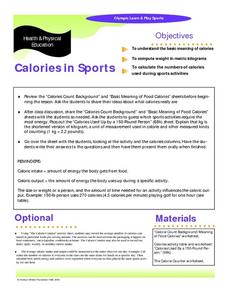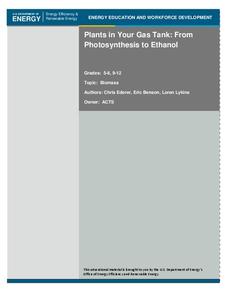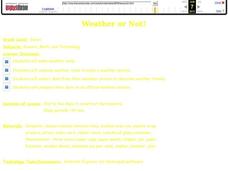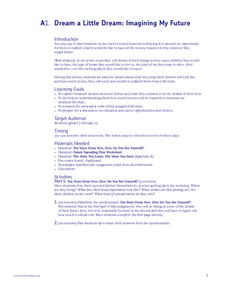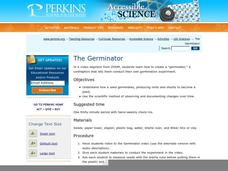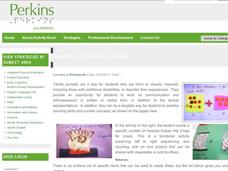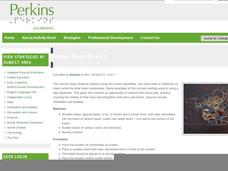Curated OER
Calories in Sports
This 4-page worksheet includes information on caloric intake and output, an activity/calorie chart, and a form for calculating the amount of calories in various foods. A good introduction to calories.
Curated OER
Plants in Your Gas Tank: From Photosynthesis to Ethanol
Explore ethanol and how it is produced. Young scientists investigate photosynthesis and fermentation to the concept of conservation of energy and mass. They discuss the environmental and economical benefits of ethanol as a fuel additive.
Curated OER
Weather or Not!
Seventh graders discuss weather. In this meteorology lesson, 7th graders view a movie on weather and take a quiz. They work in groups to make weather tools for a class weather station.
Curated OER
Build a Coral Polyp
Students build a coral polyp out of a banana, straw, oyster crackers, sprinkles, and more. In this coral polyp lesson plan, students also list the differences between plants and animals.
Curated OER
Islam: Submission to the Will of Allah
Presenting both a thorough scope of the foundations of Islam, as well as a question about Islam in America after 9/11, this slideshow provides a comprehensive outline of the background and five pillars of Islam. Viewers will walk away...
Curated OER
Street Art Project
Illuminate your playground with chaulk images. Young aratists use the web to research the work of Keith Haring. Groups then design their own piece of visual art and recreate their images on the school sidewalks of blacktop.
Curated OER
Activities in A Science Classroom
Learning Through Games and Activities Make Staying On Task in the Classroom Fun
Curated OER
Opening Presents at a Party: A Social Story
Everybody has a birthday, for some children with autism, it can be a source of anxiety. Prepare your special needs or Autistic pupil for his birthday celebration with this social story. The story can be printed out, put into book...
Curated OER
Playing Pinata at a Party
What is a Pinata and why is every body hitting it with a stick? Prepare your Autistic child for a common birthday activity that may be slightly over-stimulating. This printable book explains what a pinata is and how it is used at a...
Curated OER
Animal Sounds: The Three Little Pigs
Intended for use with the story of The Three Little Pigs, this resource offers special-needs individuals an opportunity to boost verbal skills and word recognition. Each page includes both words and vivid images to enhance the learning...
Curated OER
Creating Interesting Characters
What makes a story interesting? Complex characters! As part of a series of worksheets that prepares middle schoolers to write their own novel, the exercises included explain the role of the protagonist, the antagonist, and the supporting...
Curated OER
Sentence Completion 19
Help your English language learners deduce meaning from context clues. Eight multiple-choice questions are provided here; each one has five answer options. Example vocabulary words include refused, absent, and original.
Curated OER
Reading Graphs
Encourage kids to read line graphs with confidence using these examples and accompanying comprehension questions. Learners examine two graphs and answer four questions about each. This is definitely intended for beginners to this type of...
Curated OER
Dream a Little Dream: My Future
What will the future hold? How can I make my dreams come true? Since learners don't have fairy god mothers, they'll need to develop strong goal-oriented plans. They concoct ideas of their dream life, determine the type of income needed...
Perkins School for the Blind
The Germinator
How does a plant grow from a seed? Observe the process with a clever idea from the PBS television show ZOOM. Watch the video, then have your young botanists create their own germinators. The lesson described here is for visually impaired...
Perkins School for the Blind
Let's Pretend
Playing pretend with real objects or concepts is a wonderful way for learners to make object-to-action connections, as well as practice daily living skills. Learners with visual and intellectual disabilities use a wide variety of real...
Perkins School for the Blind
Personal Information
"Hi, how are you? My name is___." Seems simple enough but it's not always that easy to recall and relate factual information about yourself. Learners with multiple disabilities practice memorizing and relaying personal information about...
Perkins School for the Blind
Counting in Tactile Journals
This is one of those great ideas I totally love. Youngsters with visual impairments practice counting and left-to -right sequencing by counting out a set number of edible objects from the left and putting them in a bag on the right. They...
Perkins School for the Blind
Rubber Band Stretch
If you don't teach blind or visually impaired students, this lesson may seem a bit strange. But, it helps them develop motor skills, orientation and movement skills, and listening skills, while building a better understanding of...
Perkins School for the Blind
Baseball
Baseball is an American pastime, super fun to play, and can be made accessible to learners with visual impairments. Instead of taking to the ball field, your class can learn the rules of the game by playing a small three-dimensional...
Perkins School for the Blind
Conductors of Heat - Hot Spoons
Why is the end of a spoon hot when it's not all the way in the hot water? A great question deserves a great answer, and learners with visual impairments will use their auditory and tactile senses to get that answer. A talking...
Perkins School for the Blind
Polyatomic Ion Bingo
If your class is learning about polyatomic ions and needs a fun way to study those chemicals, then a bingo game might be right up your alley. This bingo game is intended to boost memorization skills, specifically the names of tricky...
Perkins School for the Blind
Mixtures and Solutions
Mixtures and solutions are different; one can be separated fairly easily and the other cannot. This hands-on experiment was written specifically for learners with visual impairments or blindness. They will use lemonade and trail mix to...
Perkins School for the Blind
The Mystery Box - Making Observations and Collecting Data
Making observations and collecting qualitative and quantitative data is a vital skill all scientists need to practice. Help your scientists with partial and no sight learn how to use their other senses to make observations for...


